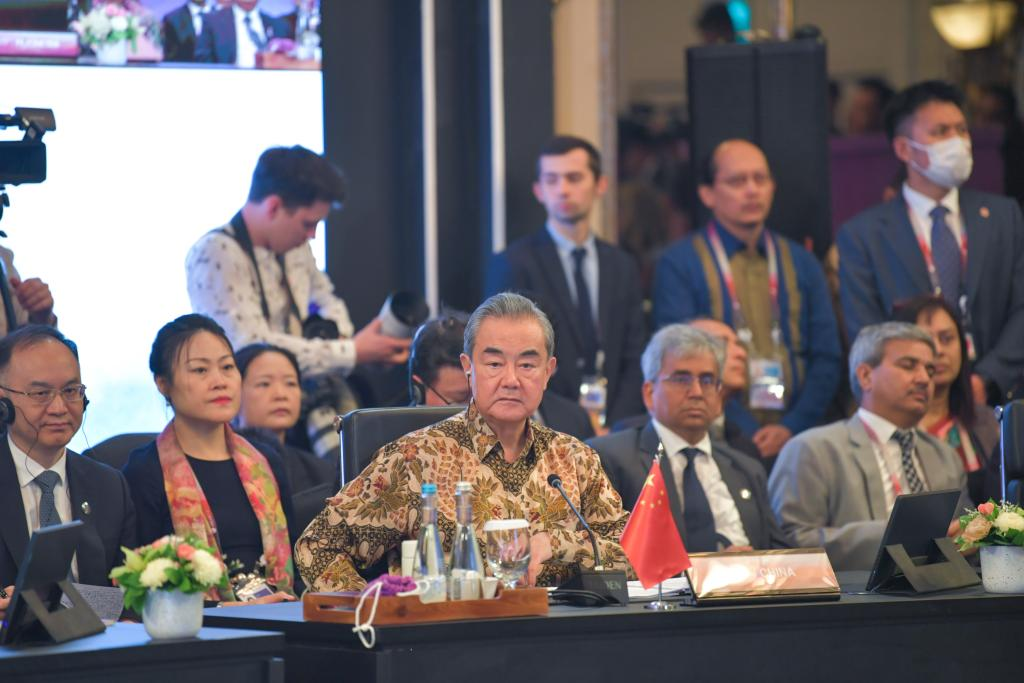Beijing tells NATO to stay out of E. Asia
By ZHANG YUNBI | CHINA DAILY | Updated: 2023-07-15 06:37

Efforts urged for growth, stability in post-pandemic era at Jakarta gathering
Beijing on Friday criticized attempts to undermine the Association of Southeast Asian Nations' central role in the East Asian regional cooperation architecture, and dismissed NATO's ambition to meddle in the region.
Wang Yi, director of the Office of the Foreign Affairs Commission of the Communist Party of China Central Committee, made the stern warning in Jakarta when attending the annual East Asia Summit Foreign Ministers' Meeting.
The meeting in the Indonesian capital gathered representatives of 10 ASEAN countries along with eight other countries — Australia, China, Japan, India, New Zealand, the Republic of Korea, Russia and the United States.
Wang called on countries to "earnestly support the central role of ASEAN and build a solid foundation for peace".
Noting that ASEAN's central role is the natural result of evolution in history and the greatest common ground of all parties, Wang rejected attempts to undermine and replace ASEAN's role, and said "it is even more unreasonable for NATO to set foot in East Asia".
The region's peace "should not be based on the pursuit of absolute security by a small number of countries", and China is willing to explore cooperation with all parties regarding the Global Security Initiative it proposed, Wang said.
He reiterated China's willingness to take the lead in signing the Protocol to the Treaty on the Southeast Asia Nuclear Weapon-Free Zone.
Observers said the region has been overshadowed by the reinforced military presence of the US and its allies in the South China Sea, policies seeking economic "decoupling" and NATO's expanded outreach in the region.
Xu Liping, a veteran researcher on Southeast Asia studies at the National Institute of International Strategy of the Chinese Academy of Social Sciences, said, "We have seen deepening geopolitical competition among major countries, the lingering Ukraine crisis and the sluggish recovery of the world economy, as well as little relief in inflation, the energy crisis and food crises."
Currently, "ASEAN countries expect to work with all parties to seek regional peace and development and effectively promote cooperation in East Asia as a whole", he said.

In Wang's speech, the senior diplomat asked nations to show their support for genuine multilateralism, strengthen benign interaction and put Asia-Pacific cooperation back on the right track.
He also called on all countries to join hands to make the region a center for economic growth, advance common development, champion the right path featuring economic globalization, and secure the multilateral trade system.
He added that China is ready to work with all parties to continue the advancement of cooperation in poverty relief and energy.
Liu Qing, vice-president of the China Institute of International Studies, said the meeting "mainly serves as a communication platform and plays a role in enhancing political mutual trust", and "ASEAN is an important engine of regional cooperation and development in Asia".
On the meeting's sidelines, Wang held bilateral talks with senior diplomats from countries including Japan, India and the ROK on Friday.
When meeting with Japanese Foreign Minister Yoshimasa Hayashi, Wang urged Tokyo to "shape an objective and rational perception of China, draw lessons from history with practical actions, and adhere to the path of peaceful development".
Recently, Tokyo has positioned China as its biggest "strategic challenge", exaggerating China's so-called "threat" on multiple occasions and in various documents. Wang said that this is "seriously inconsistent with the reality of China-Japan relations" and runs counter to the important consensus of the two sides that they "are cooperative partners, and do not pose a threat to one another".
He called on the Japanese side to "improve the feelings between the people of the two countries and promote China-Japan relations to return to the track of sound, stable development". Beijing is open to maintaining contacts at all levels, as well as economic and trade exchanges and people-to-people exchanges, he added.
Hayashi said Tokyo looks forward to building constructive and stable Japan-China relations and creating conditions for high-level exchanges.
On Friday, Wang also attended the ASEAN Regional Forum Foreign Ministers' Meeting.
























